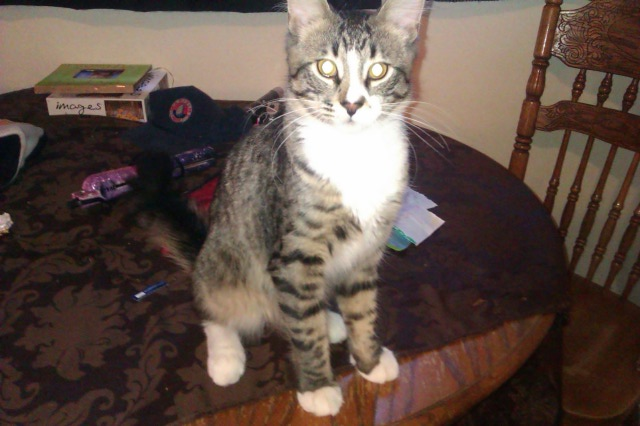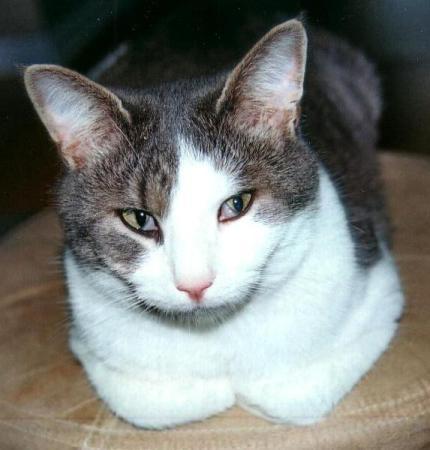QuestionQUESTION: I work at a cat rescue and a woman who lives about 2 hours away is looking to me to help. Human interference and separated days old kittens from their mother. The kittens are taking the bottle well but I AM trying to get her to trap the mother. Do you know how long it takes for the queen to dry up at this point. I heard 5 days if that's the case then should I instruct her to just proceed with bottle feeding forget trying to trap because she is doing this alone and all for the first time. The kittens are less than a week old.
ANSWER: Diane,
I'm sure that you're aware that the kittens aren't in an ideal situation, mom's milk provides the best possible nutrition for kittens, formula comes in last when it comes to ideal nutrition for kittens and should only be used when absolutely necessary. Do make sure that the caregiver isn't feeding cow's milk or human baby formula, they don't have nearly enough fat, protein or nutrients so support rapidly growing baby carnivores. This lady should also be aware that if she isn't able to catch mom or if mom doesn't accept her kittens that the kittens will have to be started on a commercial weaning formula and solid food around 4 weeks of age.
It's very important that the lady caring for the kittens is aware that the little ones have to be fed with all four paws facing the floor, or in a natural nursing position, feeding them on their backs like human infants can cause them to inhale their formula and drown. Orphaned kittens must also be gently burped after each feeding and given a bath using a cotton ball lightly moistened with warm water, I usually start from the top of the kitten's head and work back, cleaning the kitten's back and sides, then gently turning the kitten onto his/her back and cleaning the formula off of the chin and around the mouth, then moving on to clean the kitten's chest and belly. When stimulating the kittens to urinate/defecate it's important to wipe from genitals to bottom to reduce the risks of developing a urinary tract infection. Stimulating kittens to urinate is typically quite easy, however getting them to poop sometimes takes longer and requires substantial patience. If the kitten isn't stimulated to use the toilet the bladder and bowels will leak kind of like an overflow situation which isn't healthy for these babies.
The recipe that I use to feed orphaned kittens being introduced to solids is as follows: a large batch (1 cup or so) of commercially available weaning formula (KMR makes one that's available in most pet supply stores), 2-3 tablespoons of plain, organic, unsweetened, full fat yogurt and high quality organic meat such as chicken/turkey breast. I mix the weaning formula as per the directions on the package, I add the yogurt (this helps reduce the likelihood of diarrhea because it contains beneficial bacteria that's normally found in the digestive systems of mammals), you can choose to cook the meat or not, (kittens are okay to eat the raw meat provided that it's organic and fresh, if not cook the meat) all things being equal it's all about what one is comfortable with. The chop the meat up, place it in the food processor or blender, add the yogurt/weaning formula mixture a little at a time until you've got a puree that's roughly the consistency of cooked cream of wheat or slightly runny oatmeal. You can freeze any leftover weaning formula/yogurt mix in portion sized cubes then store them in a ziploc freezer bag for 3-6 months. Before serving this puree to the kittens it's important to ensure that it's roughly body temperature, I don't recommend heating any type of kitten formula or weaning diet in the microwave because it can lead to some pretty nasty hot spots that can burn the inside of a kitten's mouth quite badly which isn't what we want to do.
These kittens should also be kept in a quiet, stress free, dimly lit environment when they aren't being fed, this helps to keep them calm and when their eyes open there aren't really bright lights around which means it's not such a shock to the system. The kittens should be weighed daily on a kitchen scale that measures in grams up to two pounds, their weight should be recorded each day so that if one or more kittens starts failing to thrive the problem can be caught early and the little one can be taken to the veterinarian. If the kittens look similar to one another the caregiver can identify them individually by using a length of colored yarn tied loosely around the kitten's neck, a collar of sorts, but due to the fact that kittens are growing so quickly in the first weeks of life the lady should check that the kittens' collars haven't become too tight each day.
While I'm sure that the woman who contacted you had the best of intentions when she took the kittens in and separated them from their mother, I think that it's really important to tell her that in future if she's going to try and trap mom and bring kittens born outside into her home she should really wait to take the kittens only when she's already trapped mom. If this lady catches mom and manages to reunite the family successfully that's great, if not then I think that it would be a good plan to consider speaking to local rescues and shelters to find out if they have a queen who is lactating and has either lost her kittens or had a small litter of kittens about the same age - this would mean that she could foster the lactating mom if she adopts the orphans.
Another way of dealing with rescuing a litter of kittens is to wait until they're mobile, say around 4 weeks of age or so then trap them and bring them inside, it's obviously not ideal, but the kittens are less likely to suffer serious medical complications when things are done this way. I would really suggest that your well meaning kitty rescuer tries to catch mom before she gives birth next time in the event that she can't capture her now, that way mom can have proper nutrition during her pregnancy, her kittens can be born indoors, in a clean, safe environment and the kittens aren't taken away from mom so they learn how to be cats while benefiting from a diet meant for them - mom's milk.
Newborn kittens aren't able to regulate their own body temperature. It's important that they're kept in a warm environment, I usually keep orphaned kittens in a large adult litter box lined with old towels that the little ones can snuggle into. It's best to avoid using heating pads, since the kittens can't regulate their own body temperature at this age they can overheat quite quickly which may prove fatal in newborn kittens. As the kittens grow they'll need a bed with higher sides so that they don't escape and get themselves into trouble somewhere in the house. Essentially the kittens should probably be kept in a kitten proofed room once they're starting to be more mobile, this will help prevent accidental injuries and the general mischief that young kittens can get into. It's important for this woman to understand that these kittens are at a much higher risk of contracting viral/bacterial infections than they would have been if they'd stayed with their mother, some infections that can prove fatal to newborn/very young kittens likely wouldn't be a big deal to a vaccinated older kitten or an adult cat. These babies are at much greater risk of getting infections simply because they were taken from their mother so early. It's important that these babies are kept separated from other pets in the home and that anyone handling them should take the time to wash their hands thoroughly in hot, soapy water to reduce the risk of passing any infection along.
There is a risk that one or more of the kittens will die without any obvious reason, as I'm sure you know, kittens that are hand raised are more likely to have growth and health problems early in life due to the fact that they aren't receiving vital antibodies and there's also the fact that the kitten formulas available simply don't have the same nutrition and are difficult to digest, in fact many kittens don't digest them very well. If mom is trapped now, it's difficult to say whether or not she'll accept her kittens back. There's a very real possibility that mom has lost her maternal instincts since it's been several days, but I would encourage the person to attempt to catch mom anyhow, if only so that she can be spayed in order to prevent her from contributing anymore unwanted kittens to an already serious pet overpopulation problem. It can take mom up to 2 weeks to lose her milk supply so it's worth taking the gamble that mom hasn't dried up and will accept her kittens if she's trapped very soon. Common behavioral issues with kittens taken from mom too early include sucking on lips, hair, ears, finger tips, clothing, blankets, stuffed animals, other pets in the home and themselves in an effort to soothe themselves, it's kind of similar to a little kid that sucks his/her thumb.
Unfortunately there are less endearing behavioral issues that can come up with orphans, these kittens haven't been disciplined by mom from birth, they haven't had the chance to learn important skills from their mother. Orphaned kittens often don't understand what it means to be a cat, sometimes this can result in an overly clingy kitten that's super anxious when their human caregiver isn't around. Some kittens can behave inappropriately around other cats, because they don't understand how to read feline body language and respond appropriately to it. It's not uncommon for hand raised kittens to develop a habit of biting or scratching people early on because they've imprinted on people and initially they just don't understand that humans find play involving claws/teeth quite painful. Some of these behavioral issues can require a whole lot of patience to stop once they've started, normally when kittens are raised by their mother they get discipline and feedback from birth until she weans them somewhere in the first 12 weeks of life. It's important that the kittens' caregiver understands that while some of these behaviors may initially be cute, they won't be cute once the kitten grows up and weighs 10-15 pounds.
Humane disciplinary tools are important, initially it may be as simple as holding the kitten by the scruff of the neck and gently tapping him on the nose as mom would do in the first 6-8 weeks of life, as they get older tools such as spray bottles, shaker cans (can filled with pennies or beans and closed up, it makes a loud noise which startles cats when they're misbehaving) and cans of compressed air (the kind used to clean electronics - the hissing sound makes the point clearly, however it's important to hold the can upright at all times and to NEVER point the nozzle directly at the kitty, the can contains some propellants that can cause nasty injuries) can be introduced. When these kittens are old enough to re-home it's important that prospective adopters know they've been hand reared and what types of behavior to watch for.
In the event that the woman caring for these kittens needs some guidance or information about caring for these babies or when to expect certain developmental milestones she can contact me directly and I'll be happy to offer assistance.
---------- FOLLOW-UP ----------
QUESTION: Ok, I've fed hundreds of bottle babies that wasn't my question. The 3 day
old kittens were at animal control and she is trying to help feed them and trap
the Mom if she can. My question is what kind of a window does she have til
the mom's milk dries up. If she can't trap her in the next few days it seems a
mute point. I know after the milk is established it takes about 2 weeks.
ANSWER: Diane,
I do apologize, I wasn't trying to offend you - I simply wanted to be sure that the woman caring for the kittens has the information she needs to do so. As far as I know it should take 10-14 days at this point for mom's milk to dry up although there are exceptions to every rule.
---------- FOLLOW-UP ----------
QUESTION: Sorry but she is baulking on trapping. And it's making me a little crazy. We
met half way today to get her a trap. She's doing well and so are her babies.
I got a 2 or 3 day old kitten today I'm trying to get the momma cat that I took
out of her animal control last week her kittens are about 3 weeks old. She's
doing great with him but the kittens are kind of walking all over him.
Hopefully they'll settle down. We're supplementing him a little just in case.
We're trying to give the Mom time with him and get him some good rest. Any
suggestions?
AnswerDiane,
I understand your frustration, it's a tough situation. Hopefully the woman fostering these babies understands just how urgent it is that she traps mom and reunites the babies with their mom. I sincerely hope she understands that while bottle feeding kittens is a unique experience she understands that being raised by a mother cat is best for these foster babies in the long run. I'm glad to hear that all is going well so far. I can certainly empathize with you, kitten season is a stressful time for folks like you and I who spend our time rescuing cats and kittens. It's really difficult to see that humane education still hasn't gotten through to some kitty caregivers - many refuse to make the responsible choice to spay or neuter their cats so that they don't contribute to the already serious pet overpopulation problem. I love kittens as much as anyone else, they're absolutely adorable, but I hate seeing them abandoned, abused or neglected simply because they're unwanted. Some days it's tough to rescue cats, but it's something I wouldn't trade for anything, after all finding a cat/kitten their forever family is a great reward after the hard work is done.
As for your new foster mom, if she's not being kept in a dimly lit room that's as quiet and stress free as possible you may want to try that, this may help her relax more and her babies might not be so rough with the new baby. I'd suggest rubbing down mom's biological babies with a hand towel or face cloth then rubbing the foster baby down with the same cloth, that will put the scent of mom's kittens onto the foster kitten and it may help her older kittens treat the kitten more gently. Obviously since the foster baby is so young you're seeing issues with the older kittens, these guys also need mom, but I don't see any harm in separating the biological babies from mom for short periods of time after she's fed and bathed them so that the younger, smaller baby will have a quiet, stress free opportunity to nurse without competition.
You may also find that a homeopathic remedy called Bach's Rescue Remedy will help, it's a homeopathic remedy made from a blend of flower essences and it helps to calm and reassure. I've used this remedy for years on excitable, anxious, fearful, abused, traumatized, etc cats and kittens. If this remedy doesn't work it won't hurt anything it's a perfectly safe remedy, provided of course that anyone using it uses basic common sense, a few extra drops ending up in the water bowl won't cause an overdose or hurt anyone, however the entire bottle might cause problems. The remedy is preserved in a solution of grape alcohol which is why I don't recommend administering it directly by mouth except in an emergency. I've used this with nursing moms on many occasions and it works well, I've seen it cause some pretty amazing changes in the kittens too if they're out of sorts. Since mom's still nursing the remedy should go to her babies through her milk.
You can add 5-7 drops of Rescue Remedy to mom's water dish each morning when you clean it out and fill it with fresh water, mom will have small doses of Rescue Remedy when she drinks throughout the day. Another way to administer this remedy is to gently rub a drop of Rescue Remedy onto the relatively fur free skin in front of both mom's ears 1-2 times/day when you have a few minutes to give her a nice, relaxing massage. You can usually find Rescue Remedy in health food stores, naturopathic pharmacies, some mainstream pharmacies carry Rescue Remedy in the aisle where you'd find vitamins and other nutritional supplements and I believe you can also purchase this remedy online. The slightly larger bottle costs roughly $16 CAN and when doing cat rescues I've found it to be a useful tool. It sounds like you do some cat rescue from the local animal control/shelters so often times these kitties are stressed out when you get them.
Hopefully all of the stuff you have going on continues to go well, I'd certainly be interested to hear how things progress. I completely understand how hectic things are during kitten season. When you manage to find some time to exhale I'd be happy to hear how things turn out with the woman fostering the young kittens and trying to trap mom. I'd also be interested to find out how your little foster kitten is doing and if things work out with his new surrogate mom. I realize that it can be tough during this time of year, but I wanted to pass along some good advice that was given to me at one point - try to take some time for yourself, by taking that time to take care of yourself you'll be better equipped to care for the cats and kittens that so desperately need your help.

 Siamese Cat Question
Question
Merlin
Hello, My cat snowshoe Siamese c
Siamese Cat Question
Question
Merlin
Hello, My cat snowshoe Siamese c
 What is the breed of my cats
Question
1st
Hello Ali
Thanx for giving us time to get
What is the breed of my cats
Question
1st
Hello Ali
Thanx for giving us time to get
 The breed of my 5 1/2 month old kitten
Question
Edmund 5 1/2 months ol
Hi, my husband and I re
The breed of my 5 1/2 month old kitten
Question
Edmund 5 1/2 months ol
Hi, my husband and I re
 What Breed Is My Cat ??
Question
Cloud1 Cloud2
Hey, my boyfriend a
What Breed Is My Cat ??
Question
Cloud1 Cloud2
Hey, my boyfriend a
 third eyelid, weight gain, irritability
Question
third eyelid pic
I have a 2 year old male cat
third eyelid, weight gain, irritability
Question
third eyelid pic
I have a 2 year old male cat